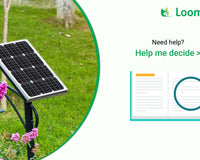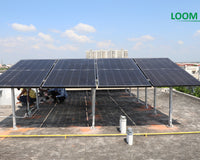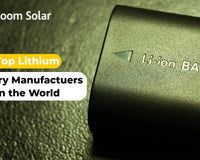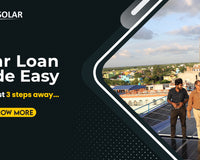It is always the primary question that appears when speaking about solar panels, “Which is the best solar panel in India?” In today’s article, we have searched for you with all the primary details that are essential to know before buying a solar panel. But before getting to the best solar panel, we must understand the types of solar panels and their usages in dedicated areas.
Which is the best solar panel in India?
The awareness of solar energy is increasing in various sectors of India; therefore, the demand for solar panels is on the rise. When planning to install solar panels, we always consider the investment. Should I choose an affordable option or a premium one? We will not discuss the price of solar panels here because it may vary depending on the quantity. So, on which parameters should you base your choice of the best solar panels?
Types of Solar Panels
1. Bifacial Solar Panel: A bifacial solar panel is a photovoltaic module with transparent back sheets or glass on both sides, capable of converting sunlight from both the front and rear surfaces into electricity. This design optimizes energy capture by utilizing direct and reflected sunlight, enhancing overall efficiency. This type of solar panels are the most powerful solar panel type due to its super high efficiency and power generation factor.They are mostly used in large scale industries, agricultural lands, large scale manufacturing plants, or something that has a large area.
Pros: This solar photovoltaic module generates up to 20% more electricity than a monofacial one.
Cons: It doesn't install on the Tin Shade / Absetos roof installation area.
2. TopCon Solar Panel: TopCon solar panels are a type of high-efficiency solar panel technology. They use a special design that places all the electrical contacts on top of the cells, allowing more sunlight to reach the cell's surface. This helps them generate more electricity from sunlight compared to traditional solar panels. TopCon stands for Tunnel Oxide Passivated Contact. These solar panels are generally used in manufacturing plants and big industries.
Pros: This solar panel exhibits optimal efficiency, superior performance, and long-lasting durability.
Cons: Designed specifically for Commercial, Industrial, Utility Scale, and Ground mounted applications.
3. DCR Solar Panel: DCR (Domestic Content Requirement) solar panels refer to photovoltaic modules that adhere to government regulations stipulating a certain percentage of the components, like cells or modules, must be manufactured within the country where they are used. These panels support local solar industry growth. They are less efficient compared to other types of solar panels. They are majorly considered for private usage such as power generation at homes, agricultural lands, shops, etc.
Pros: This solar panel is designed specifically for installation in government subsidy schemes.
Cons: It has a limited power capacity, like the SHARK at 530-540W.
4. Mono PERC Solar Panel: Mono PERC solar panels are advanced solar panels that efficiently convert sunlight into electricity. They use a special type of silicon, making them more effective at capturing energy from the sun. These panels are widely used for clean energy production. This type of solar panel is the basic type of solar panel and are less expensive than other types of solar panels. They are generally used at homes, small shops, markets, etc.
Solar Panel Manufacturer in India
Headquartered in Faridabad, Haryana, India, Loom Solar Pvt Ltd is one of the fastest evolving solar panel manufacturers in India that continues to innovate in the residential solar space. Founded in 2018, the organisation has kept itself ahead of the curve by introducing products like mono solar panels; grid connected AC Modules, shark bifacial in shark series etc. An ISO 9001-2015 certified company recognised by Govt. of India offers the widest range of solar panels from 10 watt to 530 watts and also has a manufacturing unit in Haryana confirming the ‘Make in India’ mission. Besides presence across 500 districts with over 3500 resellers, Loom Solar is embracing ‘Digital India’, with its products easily available across India and on ecommerce platforms such as Amazon, Flipkart, and www.loomsolar.com
Conclusion
Lets understand this by an example – If a person has to produce electricity for a factory or for an industry, the person has to install Bifacial solar panels due to its high efficiency and dual side power generation factor. But if a person has to produce electricity for his / her home, then a Mono PERC or a DCR solar panel will be the best available option for the person, as per the requirement.













1 comment
gsghuuu
The buzz around Titan Edge XL Gummies Reviews has been overwhelmingly positive. Users report noticeable improvements in their energy levels, stamina, and performance. Many reviews highlight the gummies’ ease of use compared to conventional supplements.
https://virmax.omeka.net/
https://forcebeast.omeka.net/
https://prelox.omeka.net/
https://spartan.omeka.net/
https://titanedge.omeka.net/
https://t.co/9oZJoxsJDw
https://t.co/OFUb0lNRVH
https://t.co/xJhcXSopXl
https://t.co/9o30e6cWgq
https://t.co/g7toWR1TAn
https://sites.google.com/view/knox-47-maleenhancement/home
https://www.facebook.com/Knox47MaleEnhancementbuy/
https://www.facebook.com/groups/knox47maleenhancementshop
https://groups.google.com/g/knox47-maleenhancement
https://colab.research.google.com/drive/1T2hOr-XfK51nyvyV2tK-xpK3GzxkHQBY?usp=sharing
https://colab.research.google.com/drive/1kixe5P3c4xdCQnxfoVI00BXM4nYgRzYP?usp=sharing
https://colab.research.google.com/drive/1FTAKYwZrIhQrU5gla3WtAM-2GjCEuSea?usp=sharing
https://knowt.com/note/2e2bf3ae-26f9-4755-81e9-2e81cca5a1dc/Knox-47-Male-Enhancement-Is-Safe-to-Use
https://knowt.com/note/d7b08b33-e427-4c0c-990f-d06894b5dc8b/Knox-47-Male-Enhancement—-Does-it-Work
https://knox47756.omeka.net/
https://knox47dugu.omeka.net/
https://knox47sideeffects.omeka.net/